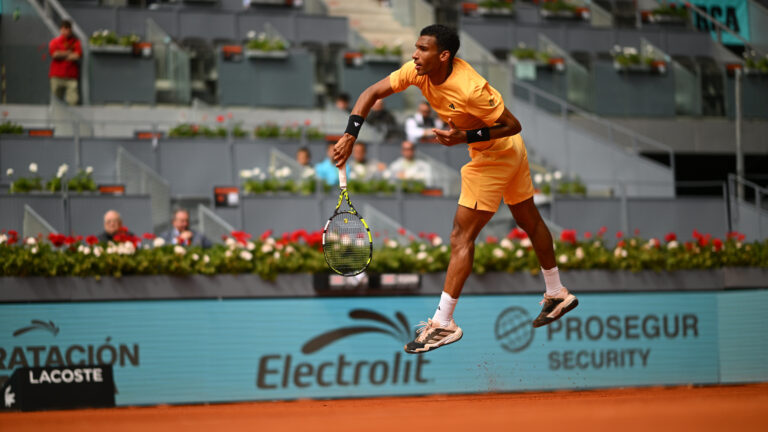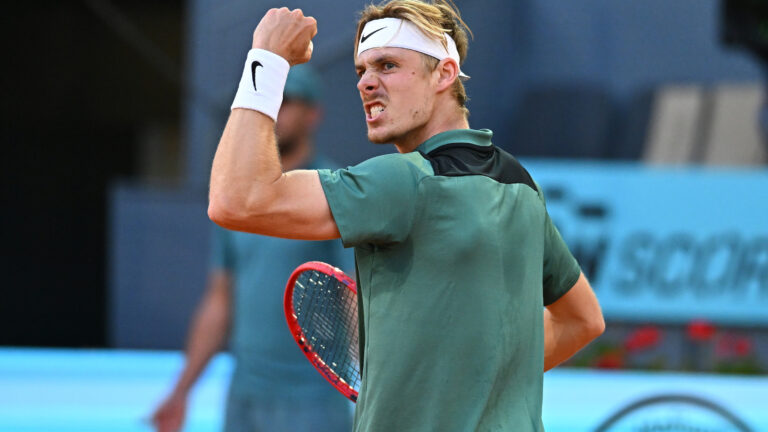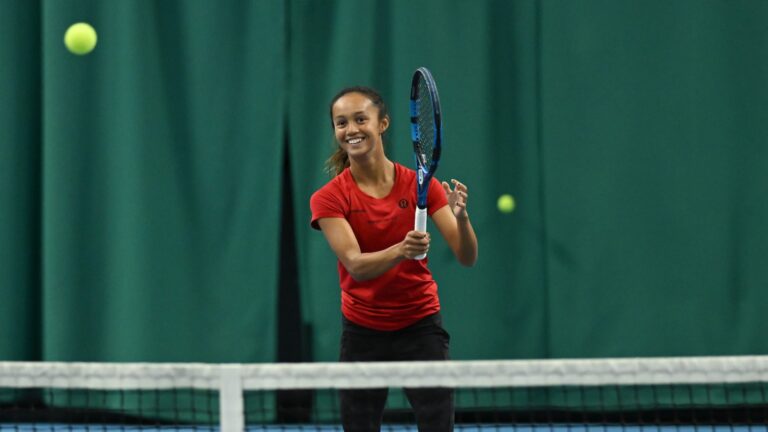TEBUTT: DOWN BUT FAR FROM OUT

Anita Aguilar/TENNIS.com
A mere bump in the road in what should to be a long and an eventful journey in women’s professional tennis is what Monday’s loss to Makarova should be for Eugenie Bouchard.
With the benefit of hindsight, it’s easy to see that the seeds of the disappointment resulting from the match with the No. 18-ranked Russian were sewn on the second Thursday of Wimbledon last July when Bouchard defeated Simona Halep to reach the final.
She had played so well through the French Open (a tough semi-final loss to eventual champion Maria Sharapova) and Wimbledon (a final loss to Petra Kvitova) that she became the immediate future of women’s tennis.
Being a participant in the most important women’s match of the year at Wimbledon raised the Bouchard profile to a whole new strata – even if she was outclassed 6-3, 6-0 by a Kvitova who was playing about as well as any woman ever has in a final at the All England Club.
“I definitely felt a lot of outside expectations and pressure to win matches,” she said about the effect Wimbledon had on her. “I felt more like it’s normal if I win and it’s a bit more of a disaster when I lose. But that’s something that I need to block out. It’s what I have been working on.”

Anita Aguilar/TENNIS.com
While it’s never easy for a player to accept defeats, especially someone as uber-competitive as Bouchard, the loss Monday may help future losses be not quite dispiriting “disasters,” to use her own word.
Talking to people in the tennis community at the US Open, it’s an almost universal belief she will remain an elite player – and very likely a Grand Slam champion in the next two or three years.

Anita Aguilar/TENNIS.com
Monday’s match was always going to be a challenge. Bouchard felt the onslaught of what it’s like to be a superstar and the face of tennis in a country and province and a city during the Coupe Rogers in Montreal last month. Losing to No. 113-ranked qualifier Shelby Rogers was a shock to her and her followers and set off a chain reaction (a 1-3 record in Montreal, Cincinnati and New Haven) that eventually made her vulnerable at Flushing Meadows.
“I’m always disappointed to lose,” she said Monday. “I gave my full effort, but not knowing that I could give everything. I didn’t have the highest expectations from myself for this tournament. Since Wimbledon it’s been a little bit of a struggle with nagging injuries (hamstring and knees). Even at the beginning of this tournament I said, ‘I know I haven’t had the proper preparation. I have really cut down on practice time.’ That affects you in a match, especially after a few tough ones late at night (at the US Open). I’m not concerned at all, but with all that and with not feeling great in my tennis, I still battled to the second week of a Slam. So there are positives. After resting a little bit I’m going to hit the practice courts.”

Anita Aguilar/TENNIS.com
Bouchard needed a medical time-out trailing 3-2 in the second set against Makarova.
“I was feeling very light headed and dizzy on the court – just seeing things a little blurry,” she said. “Feeling well physically on the court is very important to me, so when I don’t feel that…I just generally didn’t feel good.”
The story of the match should not be all about Bouchard because Makarova did play well. It should not be forgotten that she defeated Serena Williams at the 2012 Australian Open and as recently as last month upset Kvitova in Montreal. At age 26, she is at a career high ranking of No. 18 and has a big game. Five-foot-11 and left-handed, she is solidly aggressive off both sides and has a very effective serve.
Still, you have to wonder if Bouchard had been able to play the first three matches that Makarova did – 6-4, 6-2 over Grace Min, 6-1, 6-2 over Polona Hercog and 6-2, 6-4 over Zarina Diyas – if she might have been in better shape for the round-of-16 confrontation. Back-to-back three-set barn-burners that wound up 6-4 in the third set against Sorana Cirstea and Barbora Zahlavova Strycova certainly took a toll on her.

Anita Aguilar/TENNIS.com
She needed more than two hours get to her post-match media conference, and she explained what had happened to her during the match. “They think the heat got to me a little bit,” she said referring to the US Open medical team. “And I probably was more tired than usual from the past few matches. I think I did well to push myself through those matches, but I also need to have the endurance. I haven’t had that in the past few months, basically. So it’s not, you know, a huge surprise to me. It’s disappointing, but I know there’s kind of no reason to worry. Once I do a lot of good training I can compete at this level for two whole weeks hopefully.”
After starting 2014 ranked No. 32, Bouchard reached a career-high No. 7 (July 7). She’s No. 8 right now but probably a spot higher with No. 3-ranked Li Na’s future very much in doubt.
She has put tennis in Canada on the map in a way that even Milos Raonic – with a career high No. 6 – has not. Her fearless, unbridled game-style and undeniable good looks have made her a cross-over celebrity in the social and traditional media world.

“I think I have made great strides this year,” she summed up with precocious perspective for a 20-year-old. “Just playing at this high level week in and week out is something I need to get a bit more used to – how physical it is, as well. But I’m proud of how I have improved as a player and as a person. I’m looking forward to the end of the year. I want to finish on a good note.”
Bouchard begins that process at a WTA event in Hong Kong next week, where she is the main marquee name in a field that also features lesser-lights Peng Shuai and Francesca Schiavone.
She has an excellent chance to play in the BNP Paribas WTA Finals in Singapore – she’s currently No. 7 in the ‘Race To Singapore’ – from October 20-26.
The next few days and weeks and months will pass, but Bouchard’s potential will not fade. Her health permitting, she’s definitely going to be a major factor in women’s tennis for the foreseeable future.
POSPISIL OUT IN DOUBLES

Vasek Pospisil and Jack Sock were unceremoniously knocked out of the US Open doubles on Monday, beaten 6-2, 6-2 by unseeded Argentines Carlos Berlocq and Leonardo Mayer.
Pospisil lost serve in the opening game of the match and he and Sock were never really in it after that.
At the end of the first set, Pospisil/Sock had nine unforced errors and were making only 61% of first serves while Berlocq and Mayer were 89% with only one unforced error.

Usually adept on the volley, Pospisil missed several shots near the net, including the high leaping backhand volley above.
It’s hard to believe, based on their record together beginning at Wimbledon, that Pospisil and Sock would lose serve five times (and break once) in the 66-minute match.
“They started off down a break,” Canadian Davis Cup captain Martin Laurendeau said afterward about Pospisil and Sock. “The other team made a lot of first serves and put in a lot of returns. Pospisil and Sock kind of played catch-up from the very first game and were never quite able to put together a string of good points, or a string of good games. There was a good point here and there, but nothing came together.
“It was that kind of day. Their record (16-2) is very impressive, so you’ve got to think of all the good things they’ve done and move on. There’s still plenty of tennis to play in the next couple of months and still good things to happen.”

Next for Pospisil is the Davis Cup World Group Play–off tie in Halifax vs. Colombia from September 12-14.
DABROWSKI LOSES IN DOUBLES

The picture above catches the moment of victory, with winners Andrea Hlavackova and Zheng Jie about to embrace while losers Alicja Rosolska and Gabriela Dabrowski prepare for a hand slap.
The eight-seeded Hlavackova and Zheng defeated Dabrowski and Rosolska 6-4, 6-3 in a third–round match.
Dabrowski, from Ottawa, and Rosolska, a Pole, looked to be back in the match in the second set when they led the Czech-Chinese combination 3-0. But the more experienced Hlavackova and Zheng, both former Grand Slam doubles champions, ran off the final six games.

The result was the best–ever for Dabrowski and Rosolska at a Grand Slam and they will share third-round prize money of $32,163 (US).
SEBOV WINS IN JUNIORS

Katherine Sebov of Woodbridge, Ont., has moved into the second round of the junior girls event with a 6-4, 1-6, 6-3 over Ioana Loredana Rosca.
Sebov, only 15, performed well against the 15th seeded Romanian, who turns 18 in less than a month.
Very slight of build, Sebov was probably outweighed by 40 pounds by her more solidly-built opponent.
Watching the match was Robert Lansdorp, the legendary Californian who helped develop future champions such as Tracy Austin, Pete Sampras and Lindsay Davenport.
Sebov occasionally visits Lansdorp for guidance.
In the second round, Sebov will face unseeded Tami Grende, a 17-year-old from Bali, Indonesia.


